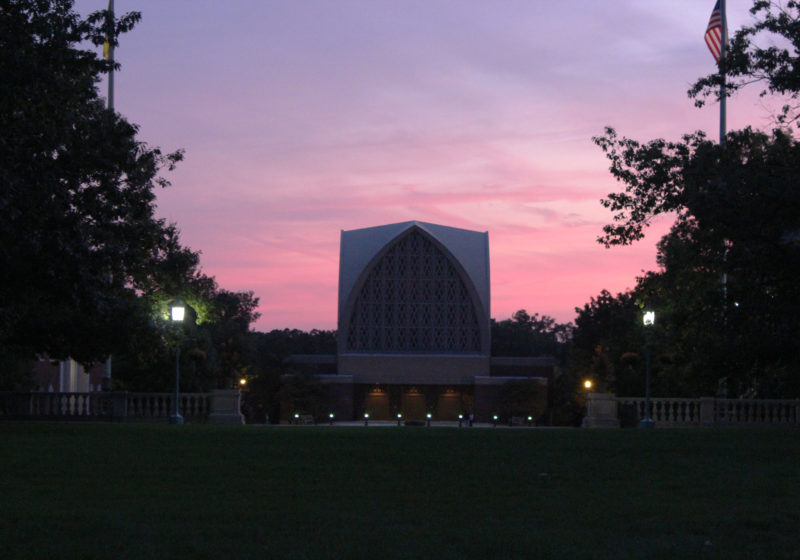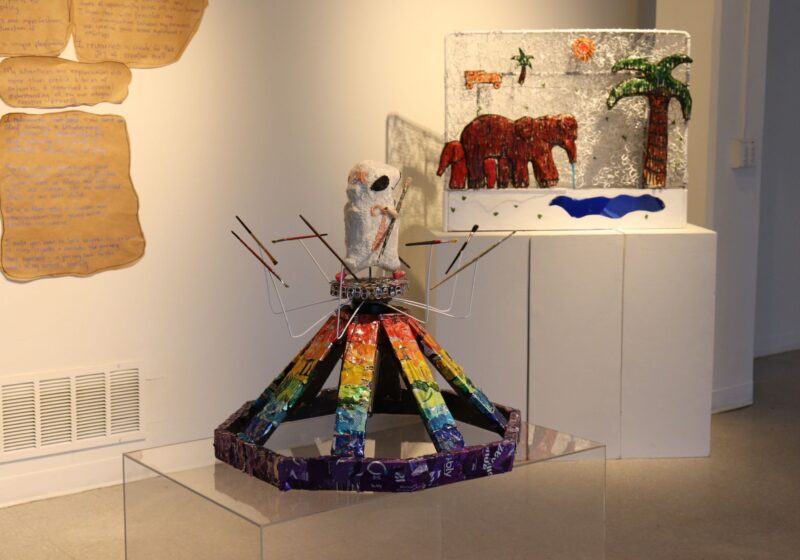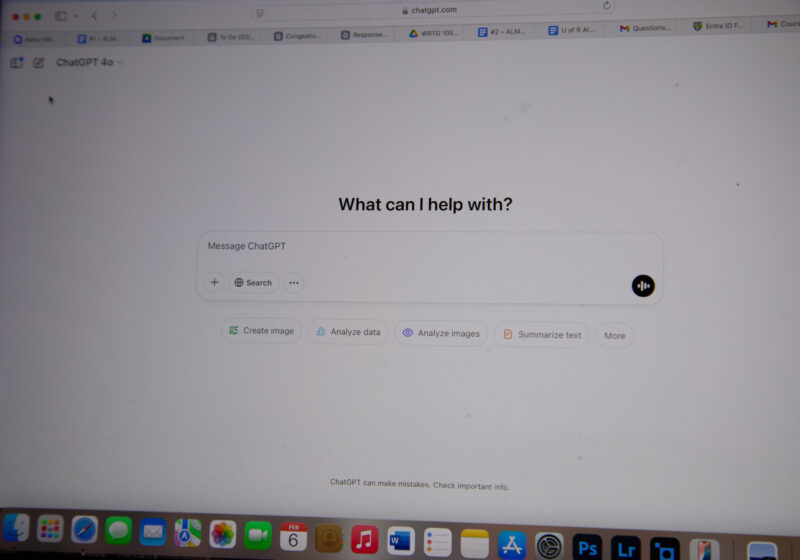A small group of UR students, faculty, and community members gathered Monday evening on the International Day of Peace (Sep. 21) to honor Daniel Prude in a candlelight vigil outside the Interfaith Chapel.
Hosted by the Interfaith Chapel, the Students’ Association for Interfaith Cooperation (SAIC), UR Christian Fellowship (URCF), and co-sponsored by College Feminists, Liberty in North Korea, and the Association for the Development of Interest in the Indian Subcontinent, this event gathered prayer from members of diverse religions, traditions, and worldviews in the Rochester community.
At the beginning of the vigil, the Interfaith Chapel’s Director of Religious and Spiritual Life Denise Yarbrough addressed and thanked the Seneca Nation of Indians and Indigenous peoples as the original caretakers of the ancestral lands the University resides on.
“Today, we acknowledge and repent of the original sins of this nation: genocide of the indigenous people, the people of this land, and the institution of slavery,” Yarbrough said.
Yarbrough went on to acknowledge the racist ideologies ingrained within society.
Junior, SA senator, and Interfaith Chapel intern Yaa Baker acknowledged the lack of justice for Prude and his family.
“I am in mourning for a man I never met because I fear that one day, it could be my brother or my mother — or me,” Baker said.
Baker transitioned into discussing the University’s success in keeping the number of COVID-19 cases low and the responsibility students have upheld during the past few weeks by wearing masks. The same amount of responsibility and “rigor” should be taken towards fighting racial injustices within the community using “our money, […] work ethic, […] and our time,” Baker said.
According to Baker, there is a lot that the UR community needs to consider.
“This is our problem, and as the university of this great city, we must respond to this tragedy and decide [if] we are going to be like the rest of our country and neglect others, or [if] we are going to commit to anti-racist action on our campus for our city,” Baker said.
Associate Director for Multiculturalism Dr. Ronke Lattimore Tapp spoke next by assuring attendees that what they were feeling in light of the protests was valid. She suggested that many people could be feeling emotionally fatigued from the inconsistency of knowledge.
“The news of this video has disrupted the world. It has shaken some sense of security — some sense of righteousness — and you [could] be disorientated,” Tapp said. “You could be struggling, feeling that you barely had time to recover from the last hashtag.”
Tapp encouraged everyone to seek help if they are struggling, and to accept the pain that comes with fighting for justice. Tapp was echoed by Dr. Jessica Guzmán-Rea, Director for the Paul J. Burgett Intercultural Center, who spoke about the importance of checking on others’ mental health.
“Racism is the first injury that scarred this country,” Tapp said. “Sometimes, you have to go through some discomfort to clean that [injury] off to heal it.”
Before Tapp left the stage, she had one more message to share with the crowd.
“I mentioned before that sometimes we can feel a connection to the lost one, whether they were blood-family or not,” she said, taking the microphone and walking over to a grassy patch in front of the chapel. “Daniel Prude I didn’t know […] personally, but he was my brother. In spirit, race, and culture.”
Using the African tradition of pouring libation, an alcoholic drink or water poured out in honour of a god or dead relation, Tapp poured water onto the grass with each prayer she made in celebration of Prude.
“Since we are all connected through this land, through this Earth, and our spirits and the energy, you may now be returned to the Earth,” Tapp said of Prude.
“Let his spirit remain and give comfort to those of us who remain,” Tapp said, while pouring the last drop of water. She finished the libation with everyone repeating affirmation in the Ewe language. “Atse,” the crowd repeated.
“Know that we are honoring him in our struggle to fight justice,” Tapp said.
A few moments went by, allowing the silence to fill the space.
Next, Rabbi Asher Yaras spoke from his own religious perspective about the Jewish New Year and how it relates to allowing time for yourself.
“There is a place to focus within ourselves while not minimizing the activism we can do with the rest of the community,” Yaras said.
Lastly, UR Christian Fellowship pastor Brian White gave condolences to Prude’s family and explained his fear of the police as a Black male.
“I do not have a police record, but I’ve been arrested several times. I know the feeling of what it’s like to put your hands on a hot hood on a summer day,” White said. “I know the feeling of what it’s like to be pushed and forced into the back of a vehicle when there’s really no room. I know what it’s like to have a gun pointed in your face — by not one but several officers at the same time.”
White paused to allow his words to sink in. Then he shifted his talk to the connection between the authority figure of the officer on the plantation during slavery and the authority figure of police today.
“The police failed to see [Daniel Prude] as a human being or a person of mercy,” White said.
“My blackness is not a crime — if anything, it confirms my humanity.”
White went on to warn the audience about unfinished action. Even as policies change, not everyone’s hearts will, and as a result, history will repeat itself, said White.
“Justice has been hoarded by those in power and I believe that it’s all of our responsibility. Justice cannot just be a figure of speech or an idea, it has to become a reality for all people,” he said.
Audience members were then offered the opportunity to speak, and afterwards, University Counseling Center therapists were available on Zoom. Throughout the talk, several speakers reminded the audience to take care of their mental health, and cited several resources on campus. These resources can be found on the University Health Services webpage.
As the students, faculty, and community members departed the vigil with their tea light candles in quiet solidarity, White left the crowd with some parting words: “Today can’t be the end. You are all educated here to do something great. My expectation is that we will be able to work together to change the world.”




